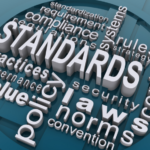ESRS Are Changing: Fewer Data Points, Smarter Reporting — What You Need to Know
The European Financial Reporting Advisory Group (EFRAG) has proposed a significant overhaul of the European Sustainability Reporting Standards (ESRS). The goal is to reduce the number of mandatory data points by at least 50%. These changes aim to simplify compliance and bring sustainability reporting closer to real-world priorities.
If approved, this could dramatically reshape how businesses — especially SMEs — approach their CSRD reporting obligations in the coming years.
The Problem EFRAG Aims to Solve
Since their adoption in 2023, the ESRS introduced thousands of data points and complex tools like double materiality assessments. While conceptually strong, their application has proven difficult for organizations with limited resources or internal ESG expertise. Many see them as burdensome, overly technical, and misaligned with day-to-day strategic needs.
Key Features of the ESRS Simplification 2025 Proposal
1. Rethinking Double Materiality
EFRAG proposes a more strategic approach to materiality, removing the need for an exhaustive checklist and allowing companies to exercise judgment.
2. Cutting Back Mandatory Data
Numerous disclosures may become voluntary or advisory, shifting focus toward information with real stakeholder value.
3. Smarter Report Formats
Clearer summaries and user-friendly layouts — such as annexes or executive overviews — would make ESG reports more readable and useful.
4. Global Standards Alignment
To reduce duplication, EFRAG intends to align ESRS with the IFRS S1 and S2 standards, already adopted in markets worldwide.
5. Relief for Special Cases
In contexts like M&A activity or value chain data gaps, companies may benefit from “relief mechanisms” — built-in flexibility to adapt.
The Road Ahead
-
July 2025: Revised ESRS drafts expected from EFRAG
-
Aug–Sept 2025: Public consultation period
-
Oct 2025: Final recommendation submitted to the European Commission
Why This Matters for your business
If adopted, the ESRS simplification 2025 will mean:
- Reduced compliance complexity, especially for SMEs and non-listed firms
-
More purpose-driven reporting, tied to actual risks and impacts
-
Improved alignment with global ESG expectations
-
A chance to reset sustainability strategy around what truly matters
From Complexity to Clarity: My Perspective
By Nikos Avlonas
At CSE, we’ve worked closely with companies navigating ESG reporting since before CSRD even existed. These proposed changes are more than regulatory — they reflect a philosophical shift. They reward materiality, strategy, and relevance over volume and formality.
This is a critical moment to reimagine your ESG narrative. And it’s one that, if handled strategically, can position you as a leader in credible, intelligent sustainability performance.
For related insights, see my thoughts on the Oman ESG Index 2025 or explore highlights from the World ESG and Climate Summit 2025.









